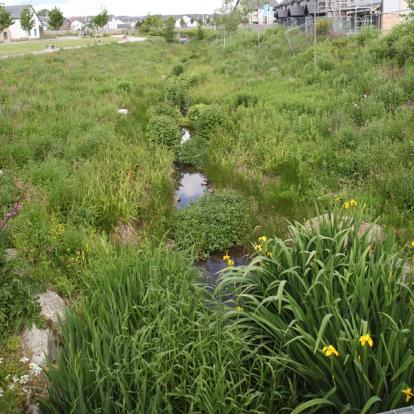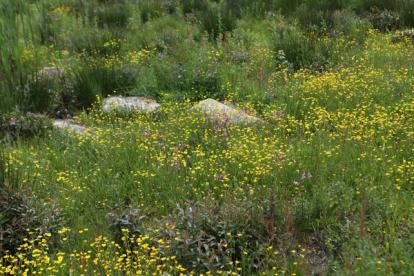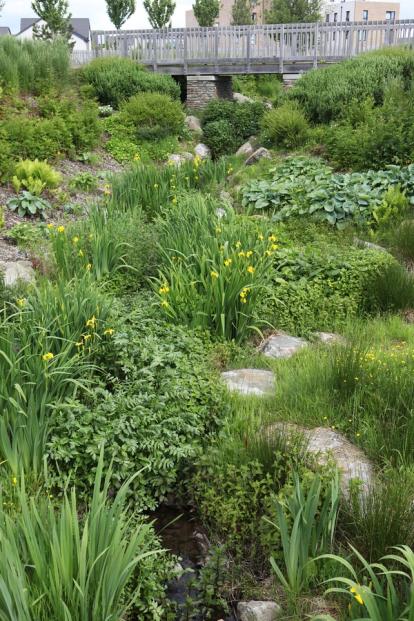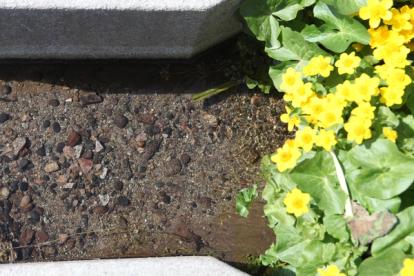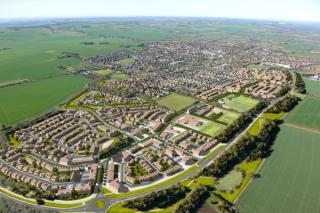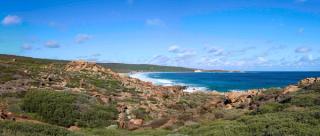
Cults Burn Park
- Client Name
- Countesswells Development Ltd.
- Location
- Aberdeen, UK
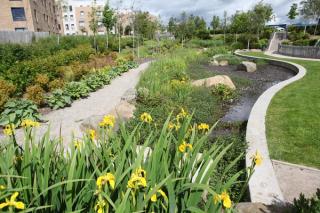
Cults Burn Park sits within the first phase of the new community of Countesswells to the west of Aberdeen. One of four main parks, a significant part was in place and functioning in time for the first residents to use and enjoy as a ‘green lung’, providing useable open space with a host of technical and intangible qualities. The Park exemplifies the overall approach of the new community by nestling into the existing landscape and connects two significant woods. The existing Core Path is maintained and enhanced through extensions and formal designations for pedestrians, cyclists and equestrian users with a clear signage system and different materials selected to support movement on foot, bike or horseback.
The site is within the watershed of the River Dee which, as one of the most protected rivers in Europe, is designated a Special Area of Conservation (SAC). The park design has therefore specifically focused on ensuring that downstream sensitivities are not impacted through a particular focus on site drainage. The existing agricultural drainage ditches which currently thread through the site are opened up to create naturalised watercourses, with a whole range of cross-sections and meanders, raised terraces, marginal aquatics and bio-diverse planting. These result in some unusual landscape features such as ‘The Beach’ which is formed from locally sourced river pebbles with granite stepping stones to cross the Cults Burn onto gently meandering gravel bound paths.
To deal with and treat the surface water that will inevitably be altered by the introduction of new urban surfaces, a Sustainable Urban Drainage System (SUDS) has been designed to collect, hold and treat water then release it back to the watercourses at the same or lesser rate than the current situation. The SUDS at Countesswells has been designed as more than simply functional grass basins which fill with water during storm events. In day-to-day conditions, they form useable open space whilst also hosting a bio-diverse range of native species including wildflower meadows which have been carefully chose to produce flowering plants from early spring through to autumn.
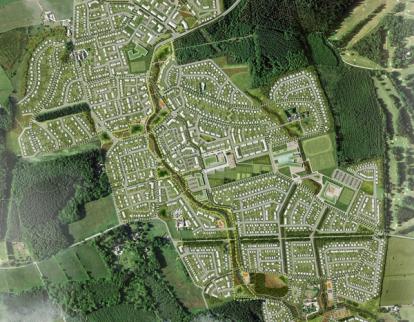
Design
The overall development of Countesswells has deployed an ‘infrastructure first’ approach to open space which resulted in the advanced delivery of a significant portion of Cults Burn Park (4.5 ha), which was in place and functioning in time for the first residents. As an integral part of the overall masterplan, the park links existing woodland areas and enhances and extends an existing Core Path with formal designations for pedestrian, cycle and equestrian movement. The park maximises existing characteristics and integrates rich layers of activities, functions and spaces. Within the first part alone, a community orchard, 600 trees, 25,000 plants, 34 species of native wildflower, have been planted. The aspiration is for a community that spends time not just in their homes but enjoying the space and facilities around them in a way that promotes health and wellbeing.
Key design approaches include:
- An innovative strategy for surface water drainage functions to protect the highly protected River Dee downstream – ensuring that the volume flowing from the site, and the quality of the water is no different from the current greenfield scenario, a huge design challenge which has been successfully achieved through a collaborative process with the various technical environmental and flooding consultees;
- A beautiful new watercourse corridor which employs various changes in horizontal and vertical alignment to replicate natural forms and introduce significant biodiversity; and
- An earthworks and grading strategy which seeks to minimise cut and fill, retain material on site and work with existing gradients and levels as far as possible.
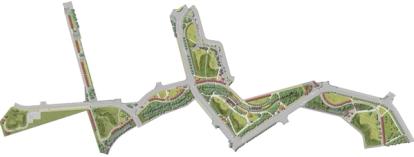
Sustainability
The park design has embedded sustainability on multiple levels, from the treatment of water and consideration of flood risk to the delivery of biodiversity net gain, targeting the creation of new habitats through a close collaborative relationship with the North-east Biodiversity Partnership. A key principle of the park design is the integration of a resilient and future-proofed surface water drainage system which recognises how climate change is impacting rainfall and weather conditions and the resultant pressure on natural systems.
*Key sustainability approaches include:*
- The design of a surface water drainage strategy which reflects the importance of the watershed of the River Dee, (one of the most protected rivers in Europe), Special Area of Conservation (SAC), a strictly protected site designated under the EC Habitats Directive;
- The SUDS has been designed as more than simply functional grass basins which fill with water during storm events. In day-to-day conditions, they form useable open space whilst also hosting a bio-diverse range of native species within various ground conditions and earth forms;
- Early engagement with North-east Scotland Biodiversity Partnership (NESBP) to collaborate on several projects that aim to protect and increase wildlife within the site and promote better awareness of biodiversity issues to residents; and
- The integration of a park movement network which prioritises walking, cycling, wheeling and equestrian routes which supports an active use of parkland spaces to encourage a healthy population.
Cults Burn Park was awarded Green Infrastructure Development of the Year at the Scottish Homes Awards 2020, was a Finalist in the Excellence in Flood and Water Management category for the Landscape Institute Awards 2022 and shortlisted for The Pineapples 2023 award category for Climate Resilience.
